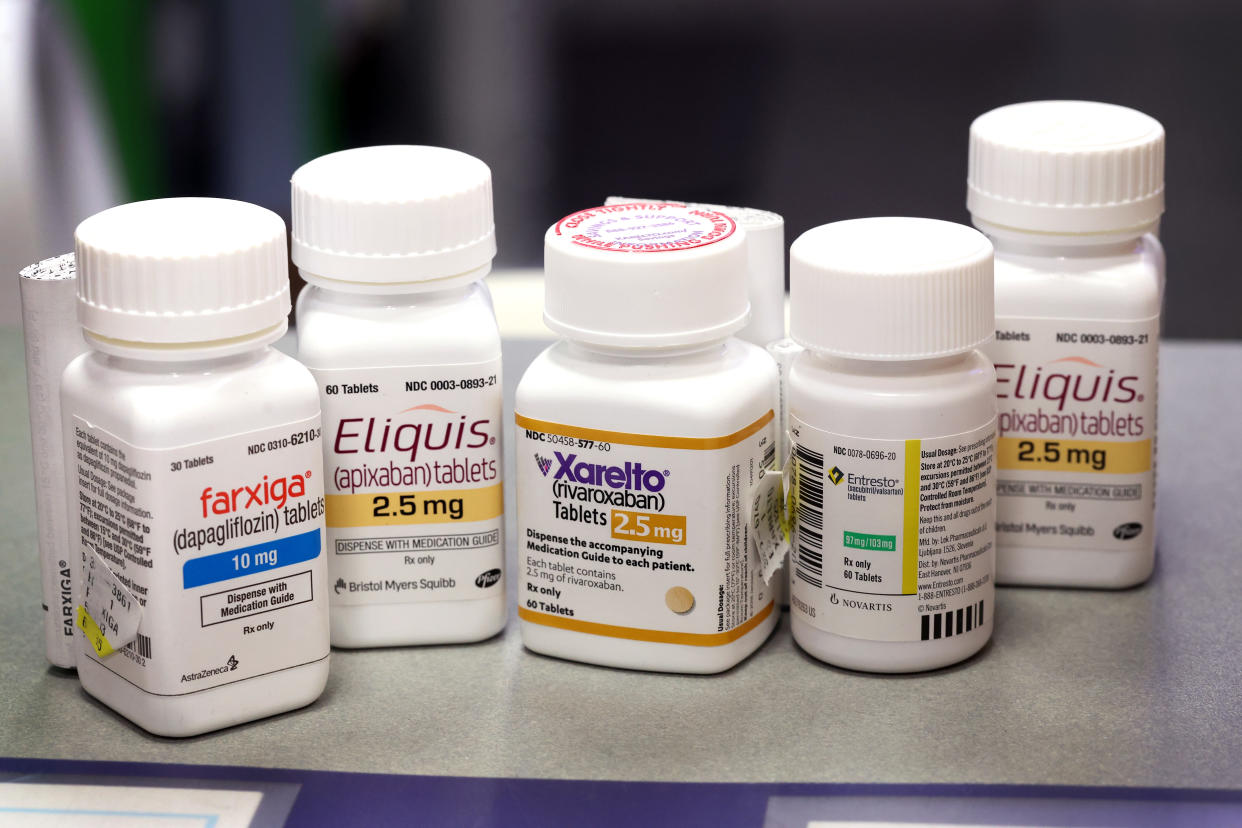Medicare's drug pricing list didn't impact company stocks — here's why
Investor sentiment was indifferent towards the historic announcement Tuesday by the Biden Administration, which revealed the first 10 drugs that would face Medicare price negotiations next year under the Inflation Reduction Act.
Stocks for all the US-publicly traded companies on the list — Bristol-Meyers Squibb (BMY), Eli Lilly (LLY), Merck (MRK), AstraZeneca (AZN), Novartis (NVS), Amgen (AMGN), Johnson & Johnson (JNJ), AbbVie (ABBV), and Novo Nordisk (NVO) — were either flat or up at the end of trading Tuesday.
Most experts weren't surprised by the drugs on the list, and prices don't go into effect until 2026. But analysts are eagerly awaiting final prices, which have yet to be negotiated.
In a note Tuesday, Goldman Sachs analysts said the minimal impact to the companies' stocks was because much remains unknown.
"We see relatively limited scope for stocks to react materially to the contents of [yesterday] morning’s announcement, given that in our view, potentially the more impactful update will come with the potential disclosure ... of [Centers for Medicare & Medicaid Services (CMS)]' initial maximum fair price offer," the analysts said.
In lawsuits filed by companies to block or delay negotiations, plaintiffs allege there is uncertainty around what the CMS will determine to be a fair price.
Medicare Director and CMS Deputy Administrator Dr. Meena Seshamani told Yahoo Finance that the agency intends to engage in a "true back-and-forth process" for negotiations.

The goal, she said, is to figure out what the real-world impact is for the drugs, so that can be taken into consideration for the price of medications.
Analysts have repeatedly said that while the CMS data shows that these drugs account for $50.5 billion, or about 20%, of Part D spend inclusive of out-of-pocket spend, some of the drugs are not necessarily top sellers for the drug manufacturers.
"Overall, [yesterday’s] update was largely expected, with key drugs included for price negotiations consisting of Eliquis (BMY) and Imbruvica (ABBV), although the inclusion of Stelara was somewhat unexpected. With biosimilars expected in 2025, however, we do not see this having a large impact on JNJ [Johnson & Johnson]," JPM analyst Chris Schott said in a note to clients.
"The rest of the drugs, meanwhile, are relatively small revenue/EPS [earnings per share] contributors to their respective stories, and we do not see any meaningful impact to our estimates from today’s update," he added.
The list included heart disease and diabetes drugs, including insulin from Novo Nordisk (NVO), some cancer drugs, and J&J's autoimmune disease treatment Stelara. The latter was a surprise to experts, in part because it will face generic competition before 2026.
Senior administration officials told reporters Tuesday there could be some adjustment to the price based on generic or biosimilar competition hitting the market before September 2024, when the prices are published, but the list would remain the same through 2026 at the least.
Leerink Partners estimates the limited impact is also due to the prices only lasting a year, before CMS begins the process again for 2027.
"JNJ’s Xarelto and NVS’s Entresto will only be affected for 1 year since they are both expected to lose exclusivity in 2027. If generics are approved for Xarelto or Entresto prior to Mar. 31, 2027 then either would be deselected on Jan. 1, 2028. MRK’s (Graybosch, OP) Januvia and AZN’s Farxiga both have [patents expiring] in 2026, thus minimizing the price control impact of these products given the likelihood of imminent generic entry," Leerink analysts said in a note.
Meanwhile, until Medicare negotiations start in February, there are several lawsuits that have been filed by drug companies and trade groups calling the process unconstitutional, in hopes of delaying or derailing negotiations.
Neera Tanden, domestic policy adviser to President Joe Biden, told reporters Tuesday that the government's health agencies negotiate prices for other parts of the healthcare system all the time.
"The only reason why Medicare has not been negotiating drug prices is because pharma got a sweetheart deal decades ago to basically prohibit negotiations. Negotiations are part of market systems; it's very normal," Tanden said.
The Congressional Budget Office estimates $90.5 billion in savings over 10 years to the Medicare program through these negotiations. Analysts expect roughly 40% reduction in prices for drugs from the negotiations.
In response to the companies trading flat on the news Tuesday, Seshamani said, "I think we know that the pharmaceutical industry is strong and thriving and innovates and will continue to innovate."
Follow Anjalee on Twitter @AnjKhem.
Click here for the latest stock market news and in-depth analysis, including events that move stocks
Read the latest financial and business news from Yahoo Finance
